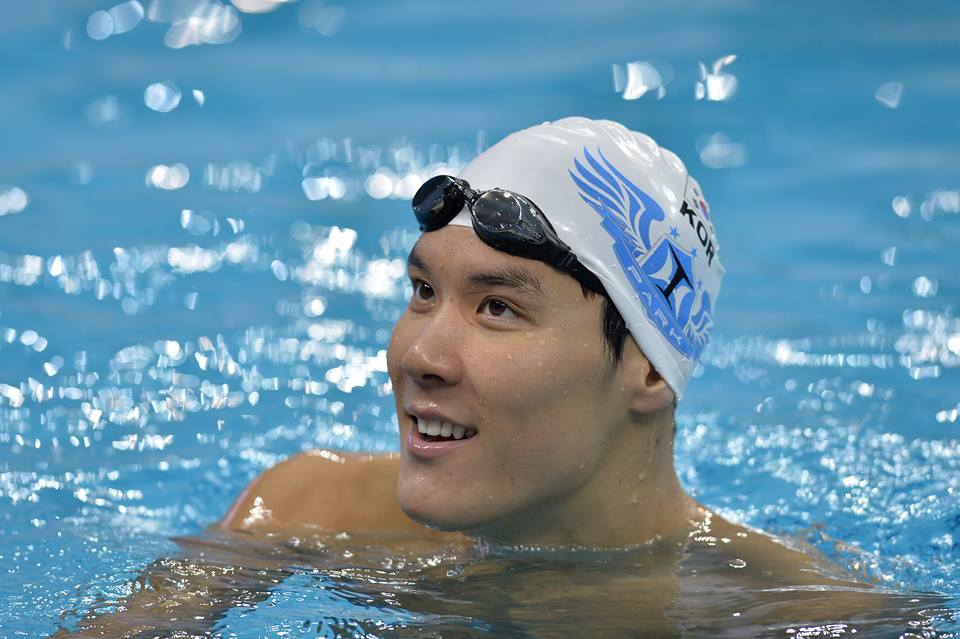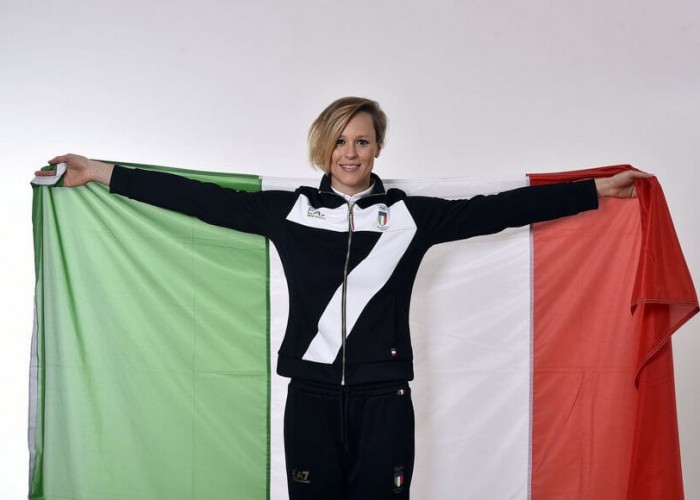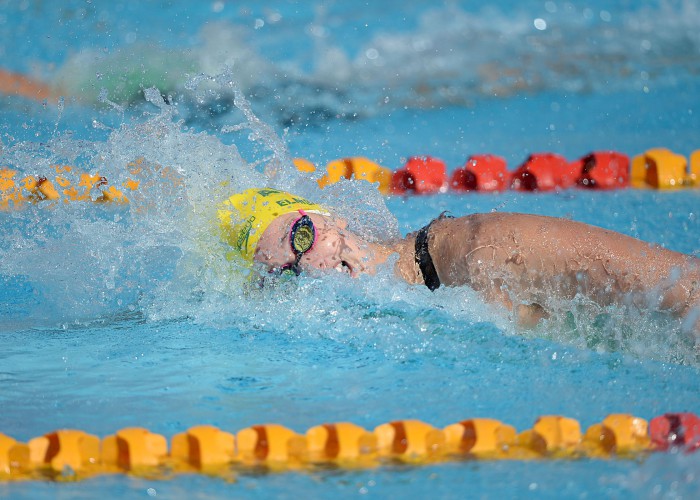7 Under-the-Radar Storylines from Short Course World Championships

By David Rieder.
You probably heard that Chad le Clos swept the butterfly events for the second-straight Short Course World Championships. It was hard to miss Katinka Hosszu winning seven gold medals and one silver in Windsor.
Then there was what went down Sunday night during the last session of the meet, when Kelsi Worrell picked up a silver medal swim in the 100 fly, collided with Emily Seebohm in the warmdown pool, got stitches and then led the U.S. women to gold in the 400 medley relay.
You know about all that. So right here, let’s catch up on the stories you might have missed during a busy six days of competition up north.
1. Park, Koch, Kawecki back on the podium.
Park Tae Hwan has been a familiar name to swimming fans ever since then-17-year-old won his first World title in the 400 free back in 2007. He won Olympic gold in the event a year later and picked up two more medals in London. But on the heels of a doping controversy that he admitted was emotionally draining, Park failed to make the semifinal in any event in Rio, finishing tenth in the 400 free and 29th in the 200 free.
Marco Koch arrived in Rio as the reigning long course World Champion in the 200 breast, but in a stacked Olympic final ended up finishing seventh in the event.
Radoslaw Kawecki, meanwhile, had been a model of consistency in the 200 back, winning three straight European championships in the event and two straight World Championship silvers heading into this year. But in Rio, when the dust cleared after the prelims of his best event, Kawecki found himself 17th, his time of 1:57.61 three one-hundredths too slow to move on.
All three took out a measure of revenge in Windsor. Kawecki dominated the 200 back final. Koch, meanwhile, took gold in the 100 breast—an event which he rarely swims internationally—and in the 200 breast, pulling away down the stretch in both finals.
Most stunning, though, was Park’s turnaround, as he found himself back on the top of the podium in the 200, 400 and 1500 free and even made the final in the 100 free. His typical closing burst pushed him past Aleksandr Krasnyth in the 400 final, and in the 1500 he dominated, beating Olympic gold medalist Gregorio Paltrinieri by more than six seconds.
Do these three still have plenty to prove in the long course pool? Of course—many of their top competitors skipped the Windsor meet. But all three will have their chance to do so in eight months’ time in Budapest.
2. Federica Pellegrini does what she does… again.
If it seems like Federica Pellegrini has been in every single international 200 free final you can remember, there’s a good reason for that. She probably has been.
Go all the way back to 2004, when a 16-year-old Pellegrini swam in lane four in the women’s 200 free final in Athens. She was the top qualifier headed into the final and actually had the lead with 50 meters to go.
While you’re at it, look who else was in that Athens final: Dana Vollmer is still around (although she has not swum the 200 free since 2012), but everyone else is long since retired. Pellegrini, meanwhile, has won a medal in the 200 free at each of the last six long course World Championships.
If she’s close with 50 meters to go, she’s always dangerous—exactly the reason no one, Katie Ledecky included, can keep pace with her long course world record on the way home. Amazingly, for all her career accomplishments, Pellegrini’s come-from-behind win over Katinka Hosszu in the 200 free on the first night in Windsor was the first Short Course World title of her career.

Photo Courtesy: Italian Olympic Committee
3. Puts and Bilis win sprint gold medals.
The Netherlands’ Jesse Puts won gold in the men’s 50 free at Short Course Worlds, and Lithuania’s Simonas Bilis earned the top spot on the podium in the men’s 100 free. A lot of you are probably reading this and asking, “Who?”
Fans of NCAA swimming should remember Bilis from his exploits at NC State. In his final NCAA championships, Bilis finished second to Caeleb Dressel in the 100-yard free and led his team to a win in the 400 free relay. Bilis swam in his first Olympics in Rio, where he finished a disappointing 30th in the 100 free but rebounded to make the final in the 50.
As for Puts, he was not even in Rio. About a month before the Olympics, he posted a 22.03 in the long course 50 free to match the national record of Dutch legend Pieter van den Hoogenband, three one-hundredths short of the required qualifying time.
Can these two make the leap to the elite level in the long course pool, particularly when Olympic medalists who passed on Windsor return? Their ages—Bilis is 23 and Puts 22—give credence to the thought that both could be the real deal. But more will become clear when the world returns to long course competition in the coming months.
4. Brittany Elmslie is more than Australia’s no. 4.
Brittany Elmslie has stood on plenty of podiums over the past few years, typically as a key member of Australia’s 400 free relay team. She swam on the finals’ squad that upset the Netherlands to win 2012 Olympic gold in London, and she joined the more-heralded trio of Cate Campbell, Bronte Campbell and Emma McKeon to set a world record on the way to gold in Rio.
But Elmslie’s international contributions have typically been limited to relay duty, and she rarely qualifies to swim any individual events at major international meets. In fact, prior to her efforts in Windsor last week, her only previous individual medal had come at the 2014 Commonwealth Games, where she picked up a bronze in the 50 fly.
So when she touched out Ranomi Kromowidjojo and Penny Oleksiak—both of whom have won Olympic gold medals in the event—it was a special moment for the least-talked-about member of the world record quartet. In Windsor, Elmslie also had the opportunity to step into anchor duty on the 400 medley relay, where she helped Australia earn a bronze.

Photo Courtesy: Delly Carr
5. Russia sweeps men’s relay the week of the second McLaren Report.
The Russian men won all five men’s relays in Windsor riding the superior efforts of Vladimir Morozov and, in the 800 relay, Aleksandr Krasnykh, who anchored in a blistering 1:40.93 to pull away from the United States and win gold.
In 200 and 400 free and medley relays as well as the mixed 200 free relay, Morozov was a nightmare for opponents, splitting as low as 20.44 for the 50 and 45.42 in the 100. Even though Morozov’s individual performances were up-and-down—he finished a surprising sixth in the 100 IM and missed the semifinals in the 100 free—Windsor still proved a banner meet for the Russian men.
But halfway through the meet, Richard McLaren released his second Independent Person report, further incriminating Russia for its state-sponsored doping program. The International Olympic Committee promptly released a statement promising a full investigation and hinting that sanctions could be forthcoming.
It was a fruitful week for Russian athletes, but the country’s immediate future in international sports has muddied.
6. Michael Andrew makes his golden debut.
Michael Andrew has been breaking U.S. age group records for years now, and he’s earned plenty of attention for his training style and for turning professional at the age of 14. In Windsor, he finally earned a chance to represent the United States on a senior level, and he promptly earned the only gold medal of the meet for the American men.
Andrew won the 100 IM final in 51.84, holding off Japanese veteran Daiya Seto. An awesome accomplishment, to be sure, but how does it translate to long course? For obvious reasons, the 100 IM does not exist as a long course event.
So what is Andrew’s specialty in long course? That’s till unclear. His week in Windsor also included a ninth-place finish in the 50 breast, where he finished a tenth of a second out of the final, and a 23rd-place finish in the 200 IM, missing the final by 3.5 seconds.
His top performance at Olympic Trials this summer came in the 100 breast, where he finished an impressive fourth in 59.82. He also finished sixth in the semifinals of the 200 IM before scratching the final, and he also made the semifinals of the 50 free and 100 fly.
Plenty of attention figures to be on Andrew at this summer’s World Championship Trials in Indianapolis, particularly after finishing fourth at Trials and winning gold in Windsor, but when he arrives in Indianapolis, he will still be just 18 years old.
7. Madison Kennedy breaks through.
Madison Kennedy is 28 years old and will turn 29 next week. After years of close calls, Kennedy looked like her chance to break onto an Olympic team might come this past summer in Omaha in the 50 free, but she finished third, 0.15 behind eventual Olympic silver medalist Simone Manuel.
Kennedy being Kennedy, she was back in Charlotte the next week to work her two jobs, and it was back in the pool soon after.
Even though she’d never been to an Olympics or long course World Championships, she had plenty of international experience. But individually, she’d never won a medal. She came close at the 2014 Short Course Worlds, finishing fourth in the 50 free, and then seven months later, she was fifth in the 50 free at the Pan American Games.
That is, until Sunday night, when Kennedy, swimming in the 50 free final in Windsor in lane eight, got off the blocks quick and held on to pick up a bronze medal. Again, this is an almost-29-year-old woman coming off a heartbreaking Olympic Trials. She still works full-time, and she keeps on sprinting.
All commentaries are the opinion of the author and do not necessarily reflect the views of Swimming World Magazine nor its staff.




